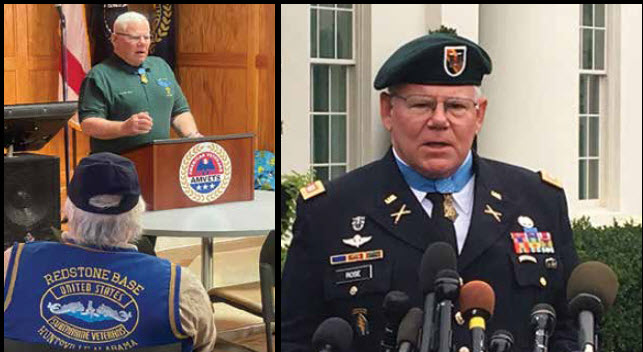 By: Sandra Erickson
By: Sandra Erickson
On Saturday, December 10, 2022, Medal of Honor recipient Gary Michael “Mike” Rose spoke to a gathering of US Submarine Veterans, AMVETS veterans, and other attendees about the events that led to his nomination and subsequent presentation of this prestigious award.
Rose was awarded the Medal of Honor in October 2017 by President Donald Trump for his actions while serving as a combat medic in Vietnam with the 5th Special Forces Group (Airborne). This medal is the nation’s highest award for military service that is awarded by Congress.
The citation found on the Congressional Medal of Honor Society reads, “Between 11 and 14 September 1970, Sergeant Rose’s company was continuously engaged by a well-armed and numerically superior hostile force deep in enemy-controlled territory. Enemy B-40 rockets and mortar rounds rained down while the adversary sprayed the area with small arms and machine gun fire, wounding many and forcing everyone to seek cover.
“Sergeant Rose, braving the hail of bullets, sprinted fifty meters to a wounded soldier’s side. He then used his own body to protect the casualty from further injury while treating his wounds. After stabilizing the casualty, Sergeant Rose carried him through the bullet-ridden combat zone to protective cover.
“As the enemy accelerated the attack, Sergeant Rose continuously exposed himself to intense fire as he fearlessly moved from casualty to casualty, administering life-saving aid. A B-40 rocket impacted just meters from Sergeant Rose, knocking him from his feet and injuring his head, hand, and foot. Ignoring his wounds, Sergeant Rose struggled to his feet and continued to render aid to the other injured soldiers.
“During an attempted medevac, Sergeant Rose again exposed himself to enemy fire as he attempted to hoist wounded personnel up to the hovering helicopter, which was unable to land due to unsuitable terrain. The medevac mission was aborted due to intense enemy fire and the helicopter crashed a few miles away due to the enemy fire sustained during the attempted extraction. Over the next two days, Sergeant Rose continued to expose himself to enemy fire in order to treat the wounded, estimated to be half of the company’s personnel.
“On September 14, during the company’s eventual helicopter extraction, the enemy launched a full-scale offensive. Sergeant Rose, after loading wounded personnel on the first set of extraction helicopters, returned to the outer perimeter under enemy fire, carrying friendly casualties and moving wounded personnel to more secure positions until they could be evacuated. He then returned to the perimeter to help repel the enemy until the final extraction helicopter arrived.
“As the final helicopter was loaded, the enemy began to overrun the company’s position, and the helicopter’s Marine door gunner was shot in the neck. Sergeant Rose instantly administered critical medical treatment onboard the helicopter, saving the Marine’s life. The helicopter carrying Sergeant Rose crashed several hundred meters from the evacuation point, further injuring Sergeant Rose and the personnel on board. Despite his numerous wounds from the past three days, Sergeant Rose continued to pull and carry unconscious and wounded personnel out of the burning wreckage and continued to administer aid to the wounded until another extraction helicopter arrived.”
Rose enlisted in the U. S. Army on April 4, 1967. After his distinguished military career that includes three tours of duty in Thailand, South Vietnam, and Panama, he retired in May 1987 as a Captain, then permanently retired in 2010.
Rose’s military awards include the Distinguished Service Cross, the Bronze Star Medal with one oak leaf cluster and “V” device, the Purple Heart with two oak leaf clusters, the Meritorious Service Medal, the Air Medal, the Army Achievement Medal, the Good Conduct Medal with two knots, National Defense Medal, Vietnam Campaign with star, Presidential Unit Citation (MAC SOG), Vietnam Civic Action Honor Medal, Vietnam Campaign Medal, Vietnamese Cross of Gallantry Unit Citation – with Palm Combat Medical Badge, Special Forces Tab, U.S. Army Parachute Badge, Thai Army Parachute Badge, Vietnam Parachute Badge, and several service ribbons.
Captain Rose, exemplifying the humility he is known for, told the audience the Medal was not his and he was merely the custodian. His comment echoes his remarks from 2017 when he was quoted as saying, “This is our Medal. Not mine.”
Rose shared interesting details about the Medal, such as the inscription on the back bearing the recipient’s rank at the time of the action rather than the highest rank achieved and the date the Medal was awarded.
Captain Rose responded to a question about PTSD and veterans’ mental health needs. He reinforced the need for veterans to connect and check in with each other even if that conversation was going to be difficult. He said he would rather lose a friendship by having a difficult conversation with someone about their struggles with PTSD and moral injury than to lose someone from missing that opportunity.
Rose shared stories of the heroic acts of many submariners and other veterans which highlighted the connections between the military branches as well our interdependence on each other.
By: Sandra Erickson







